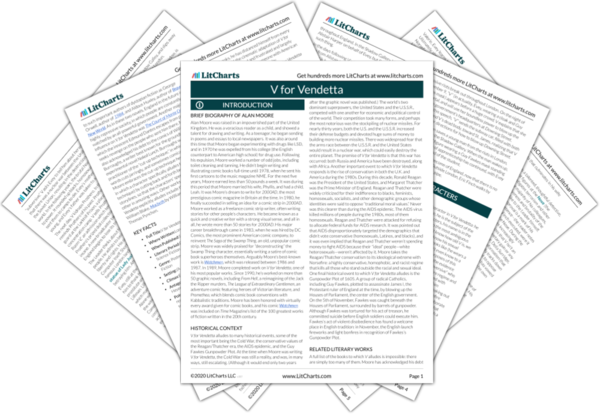Summary
Analysis
In the Shadow Gallery, Evey surveys a staircase, which is emblazoned with “V.V.V.V.V.” Evey asks V what this means. V explains that it’s shorthand for a Latin phrase which means, “by the power of truth, I, while living, have conquered the universe.” Evey, excited by V’s lifestyle, asks if she can help V with one of his next “projects.” V assures Evey that she’s under no obligation to help him, but Evey insists that she wants to “make a deal.” V agrees, though he notes, half to himself, that the speaker of the Latin phrase was Dr. Faust, who also “made a deal.”
The “Faustian Deal” to which V alludes is one of the key myths of European culture. In German tradition, Doctor Faust made a deal with the devil: the devil would give Faust unlimited power and knowledge, in return for which Faust would give the devil his soul (in Goethe’s version of the story, the deal is a little different). V seems to think that Evey is taking a great leap forward by making a deal with him—but he acknowledges that she might regret her decision. At least it seems that Evey is trying to take more control over her own life, even if for now she is merely fascinated by the glamorous figure who saved her life.
Themes
At Westminster Abbey, in December 20th, a large congregation assembles to listen to a bishop’s sermon. The bishop, Anthony Lilliman, praises God for sparing England from his punishment, and prays that God will keep the people safe from the “evil one.” He concludes that they are “one race, one nation, one love.”
We see how Norsefire has co-opted Christianity to fit its racist, Fascist agenda. This is a state-sponsored religion that unites the people of England together—partly by treating the English as “one race.” Underneath the bland slogans of the sermon lie justifications for bigotry and genocide.
Themes
After the sermon concludes, Derek Almond walks to his car, accompanied by his wife, Rosemary Almond. Two friends, Conrad Heyer (from the Eye) and Helen Heyer, Conrad’s wife, greet the Almonds and ask if Derek has any information about the terrorist who blew up Parliament. Almond replies that he’s sure the government will catch him eventually, but says little else on the matter. Helen jokes that Conrad is London’s “highest paid peeping Tom,” and listens to people’s lives all day long. As the Heyers leave, Rosemary notes to Derek that Helen is very harsh about her husband. Derek angrily objects that Helen Heyer is twice the woman Rosemary is.
We see more ramifications of Norsefire’s bigotry. The men in England are, for the most part, aggressive and violent, while their wives are supposed to be docile and meek. One notable exception to this rule comes in the form of Conrad and Helen Heyer: Conrad is calm and weak, while Helen seems stronger and savvier than her husband. Yet even here, Conrad is the one with a government job, not Helen: Norsefire’s sexism is so pervasive that intelligent women can’t get a good job of any kind.
Themes
Anthony Lilliman stands in his room, accompanied by his servant, Dennis. He asks Dennis if his “young lady” has arrived, and Dennis informs him that there was a mix-up at “the agency”—there is an older girl, about sixteen. Lilliman grudgingly agrees to accept this girl. Dennis sends in the girl, who turns out to be Evey, dressed in a childish pink dress. Bishop Lilliman smiles with pleasure and tells Evey that she will “do.”
We see the hypocrisy of Lilliman—and of Norsefire society—very clearly. While preaching about the value of chastity and morality, Lilliman indulges in his own horrible impulses—his pedophilic lust for children—and seemingly feels no remorse and faces no consequences. Lilliman is here a grotesque version the “father-figure” Evey craves.
Themes
Get the entire V for Vendetta LitChart as a printable PDF.

Meanwhile, in the Shadow Gallery, V prepares for another mission. He takes a rose, identical to the one he left for Lewis Prothero, and leaves, reciting William Blake’s poem “Jerusalem” to himself.
We’ve already seen that V uses roses to mark his crimes, so we can’t help but assume that V Lilliman is his next victim. V’s mention of “Jerusalem” reminds us of the scope of his plans: he wants to bring utopia to (from the poem) “England’s green and pleasant land.”
Themes












